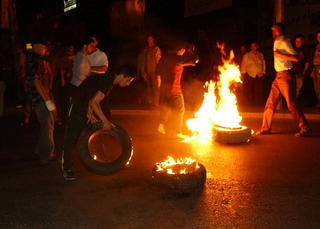"God, Nasrallah and all of the southern suburbs," chanted the men, waving yellow Hizbullah flags. After the program ended late on Thursday, Hizbullah followers also staged nighttime protests in various parts of the capital, in several towns in southern Lebanon, and in the Bekaa Valley near the border with Syria. The protests only ended after Nasrallah personally made a plea for calm on television during the night in order "to protect the country’s security and stability".
He also called for the need to find ways to protect "political and moral values". "Three of us spent the night in hospital for treatment after we were beaten" by protestors in Beirut’s Christian neighborhood of Ashrafiyeh, said Sami Gemayel, son of former president and the supreme chief of the Christian party Kataeb, Amin Gemayel. Gemayel said that he suffered bruising to his back, and university students Gilbert Rizk and Bassam Samarani underwent surgery on their faces and noses. "We were awaiting the army to stop the protestors from entering Ashrafiyeh, and we did not want them to enter Monot street," which is lined with restaurants and nightclubs, he said.
"Then, suddenly dozens of them attacked us. They beat us with their hands, iron bars and batons," said Gemayel.
The weekly satirical program, which showed a man wearing a beard and turban impersonating Nasrallah, is broadcast on the Lebanese Broadcasting Corporation International (LBCI) private TV channel, and includes sketches that regularly portray Lebanese politicians.
LBCI was formerly the mouthpiece of the Lebanese Forces militia.
"This program is part of a campaign aimed at liquidating the resistance," Hizbullah MP Ali Ammar told reporters during the overnight protests.
Later on Friday the country’s National Audiovisual Council broadcasting watchdog held a special session to denounce the broadcast, and demanded an explanation from LBCI.
"If LBCI does not apologize, the Council will take disciplinary measures against it, since the broadcasting law forbids attacks on religious figures," the watchdog’s president Abdel Hadi Mahfouz told journalists.
The show’s producer, Charbel Dagher, has already apologized publicly, saying that the program was not intended to undermine the Hizbullah leader.
Hizbullah has faced growing domestic and international pressure to disarm, particularly with the passing of UN Security Council Resolution 1559, which was adopted in September 2004 and called for the disarmament of all militias in Lebanon.
Hizbullah, the only armed group not required to lay down its weapons after the 1975-90 civil war in Lebanon because it was spearheading the fight against Israel, is considered a terrorist organization by Washington.
 Nayla Razzouk, AFP,
Nayla Razzouk, AFP, 


